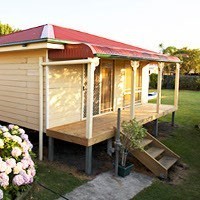

Two Australian small businesses will face off in the Federal Court over allegations one of the builders has been trading off the other’s designs and marketing material.
Family-owned builder Ian Cubitt’s Classic Home Improvements has initiated proceedings in the Federal Court against Granny Flat Projects, which it claims has been trading off its copyrighted designs, brochures and lawn signs for granny flats or secondary dwellings.
In a statement issued to SmartCompany, Cubitt’s said it has previously come across other companies trading off its designs and material, but that these operators have responded to quickly to warnings.
However, in the case of Granny Flat Projects, Cubitt’s said the company originally agreed to remove the copyrighted material from its marketing, but material owned by Cubitt’s again appeared in new versions of Granny Flat Projects’ marketing.
Cubitt’s is seeking all profits made by Granny Flat Projects on projects in which the disputed material was used, as well as profits on projects undertaken by Granny Flat Projects for clients that came to the firm after they had been exposed to the material in question.
“Essentially, this will be all the profits made by Granny Flat Projects,” said Cubitt’s.
Cubitt’s will also seek an injunction from the court to prevent Granny Flat Projects from using the material, as well as the destruction of all offending hard-copy and online material.
According to the statement of claim, seen by SmartCompany, the material in question includes lawn signs featuring a floorplan for a granny flat; a presentation that incorporates the same floorplan as well as others, computer generated images of the floorplans and text explaining what is included in the plans; and promotional brochures including one or more of the floorplans and accompanying text.
“Our lawyers tell us a couple of things,” a Cubitt’s spokesperson said in the same statement.
“This type of breach is aggravated and special damages apply in addition to basic damages and that in order to establish the scope of the basic damages before the aggravation is taken into account, a complete forensic investigation of the culprit’s business will be undertaken for which the perpetrator will have to pay the cost in addition to the damages and ordinary costs of the court case.”
The spokesperson said alleged copyright breaches are common in the construction industry.
“Cubitt’s alone has now had at least three examples of people trading off our intellectual property,” the spokesperson said.
“At some point, we have to put a stop not only to this example but the others who might do the same and let the industry know we will not tolerate it.”
“Not to put too fine a point on it, using someone else’s intellectual property to get a sale is stealing.”
SmartCompany contacted Granny Flat Projects but did not receive a response prior to publication.
NDA Law director and partner John MacPhail told SmartCompany it is not unusual to see instances of builders or architects alleging their designs or floorplans have been “ripped off” by others.
“Those cases are relatively straightforward and the courts have dealt with them before,” MacPhail said.
However, in this case, MacPhail says Cubbitt’s is also alleging Granny Flat Projects has traded off copyrighted marketing material, in addition to its designs.
MacPhail says there is no reason why a lawn sign for a property could not be subject to copyright, providing it is long enough and original enough.
Based on the comments by Cubbitt’s about “aggravated” damages, MacPhail says it is likely the company will allege Granny Flat Projects did not inadvertently breach its copyright, but instead acted in a sneaky or under-handed way.
However, MacPhail says it may be difficult to prove before the court that all profits made by Granny Flat Projects are the result of the alleged use of Cubitt’s copyrighted material.
While he says there is the presumption of lost sales in most intellectual-property cases, Cubitt’s are “drawing the bow slightly longer” to claim every sale made by Granny Flat Projects was a consequence of the use of the material.
“It would be very difficult to show,” MacPhail said.
“A court would normally discount profits on the basis of those types of damages and assume some sales would have been made anyway.”


COMMENTS
SmartCompany is committed to hosting lively discussions. Help us keep the conversation useful, interesting and welcoming. We aim to publish comments quickly in the interest of promoting robust conversation, but we’re a small team and we deploy filters to protect against legal risk. Occasionally your comment may be held up while it is being reviewed, but we’re working as fast as we can to keep the conversation rolling.
The SmartCompany comment section is members-only content. Please subscribe to leave a comment.
The SmartCompany comment section is members-only content. Please login to leave a comment.